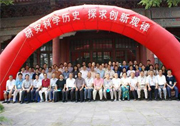| 中文题目: | 古希腊文本与分析的严格化——对拉格朗日的数学史工作的探究 | ||||||
| 英文题目: | Greek Texts and the Rigorization of Analysis: An Inquiry into J. L. Lagrange’s Work on the History of Mathematics | ||||||
| 作 者: | 王晓斐 | ||||||
| 刊物名称: | Chinese Annals of History of Science and Technology | ||||||
| 发表年度: | 2020 | ||||||
| 卷: | 4 | ||||||
| 期: | 1 | ||||||
| 页码: | 139–165 | ||||||
| 中文摘要: | |||||||
| 英文摘要: | This paper offers a study of J. L. Lagrange’s research on history of mathematics, aiming to clarify Lagrange’s intention in carrying out historical work. To this end, I first document how Lagrange worked with and exerted his influence on other scholars in the translation and diffusion of ancient Greek texts. Second, investigating Lagrange’s style in doing and writing history of mathematics, this paper takes a new perspective and elucidates his motivation in these activities. In particular, it focuses on Lagrange’s presentation of the history of calculus while he was teaching analysis at the Ecole Polytechnique (1795–1799) so as to clarify the function of history in Lagrange’s mathematical works. My thesis is that Lagrange’s intention in examining the different methods employed by his predecessors was to find inspiration and useful contents in his search for the proper approach to mathematical problems. I thus argue in this paper that history served as a guide or methodology for Lagrange’s mathematics. Meanwhile, through an analysis of his historical writing, this paper points to four epistemological values according to which Lagrange judged various historical methods of differential calculus: generality, simplicity, clarity, and rigor. Lagrange’s move to rigorize analysis was connected to his interest in and research of Greek texts; he was attempting to introduce the rigor of the ancient Greeks’ demonstration in his works of analysis. |
||||||





